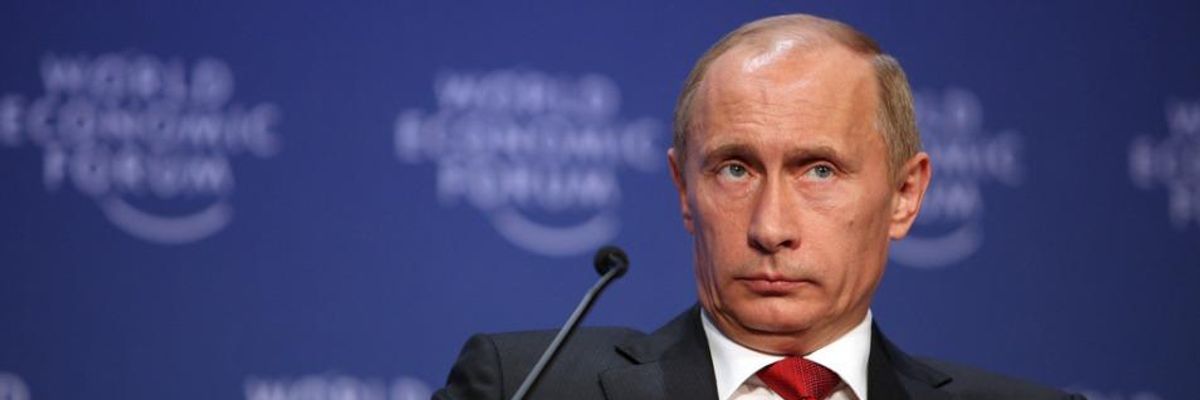Russian President Vladimir Putin on Friday signed a new military doctrine that names NATO's military presence near the country's border and expansion in Eastern Europe as Russia's top external threat, according to a Kremlin statement.
The doctrine, which Putin signed as Russia's economic power and international relations continue to deteriorate, maintains many of the provisions put into place in its previous edition, signed in 2010. Among those is the possibility of Russia using nuclear weapons in retaliation to other nations targeting Russia or its allies with weapons of mass destruction--though the doctrine concedes that those scenarios are unlikely.
A new provision, however, adds that Russia could use precision weapons "as part of strategic deterrent measures," without elaborating on how and when those weapons would be used.
"Despite a decreased likelihood of a large-scale war against Russia, some security threats continue to grow," the doctrine says.
Also included in the military document is the new goal of protecting national interests in the Arctic.
NATO denied that it posed a threat to Russia, instead accusing the country of undermining European security. The alliance's spokesperson, Oana Lungescu, said in a statement that NATO "poses no threat to Russia or any nation."
"Any steps taken by NATO to ensure the security of its members are clearly defensive in nature, proportionate and in compliance with international law," she said. "In fact, it is Russia's actions, including currently in Ukraine, which are breaking international law and undermining European security."
Russia's military intervention in Ukraine, as well as the annexation of Crimea in March, has led the U.S. to impose ever-increasing sanctions against the country--which, in turn, contributed to Russia's recent financial crisis.
Further, in October, NATO Secretary-General Jens Stoltenberg declared that the alliance could deploy its troops "wherever we want to" in Eastern Europe. The announcement came shortly after NATO vowed to create "rapid response" military forces to fight Russia.
"These capabilities already exist," Stoltenberg told Polish state broadcaster TVP. "We have them, and we can deploy them in individual regions. And this is only an add-on to what the alliance already has." Stoltenberg's comments--and NATO's years-long military expansion in Baltic states and recent presence on the Russian border--seemed to defy the 1997 NATO-Russia Founding Act, in which the alliance agreed to avoid "permanent stationing of substantial combat forces" to Eastern and Central Europe.
Ukraine and the West have also accused Russia of fueling a separatist insurgency in Donetsk and other areas in eastern Ukraine, supplying troops and weapons to pro-Russian rebels, but the Kremlin has denied those charges. In November, Kiev army spokesperson Andriy Lysenko accused Russia of sending tanks and artillery over the border into eastern Ukraine, but presented "no evidence or timetable" for the information.
The doctrine comes shortly after Ukraine took further steps to gain NATO membership, voting to drop the country's "non-aligned" status, a move which Russia had outspokenly opposed. After the vote on Tuesday, Russian Foreign Minister Sergei Lavrov said the vote was "counterproductive" and that it would deepen the rift between Russia and Ukraine.
Ahead of the doctrine's release, the Russian government said NATO was turning Ukraine into a "frontline of confrontation." The Defense Ministry also posted a Tweet on Wednesday warning that Ukraine's "accession to alliance will bring Russia-NATO relations to complete collapse."

